现代大学英语精读5Lesson4ProfessionsforWomen
现代大学英语精读lessonProfessionsforWomen_图文

闹鬼的屋子及其他(The Haunted House and Others)(短篇小说集)
Modernism
Modern literary practices. Also, the principles of a literary school that lasted roughly the beginning the 20th century until the end of World War II. Modernism is defined by its rejection of the literary conventions of the nineteenth century and by its opposition to conventional morality, taste, traditions and economic values.
Her Writing Style
experimentation and innovation in novel writing the psychological realm of her characters and the
moment-by-moment experience of living the techniques of interior monologue and stream of
contribution, influence, writing style) 3. Modernism (time. Characteristics, representatives,
influence) 4. The characteristics of the language in this essay. (using
大学精读英语unit4 professional for women 重点
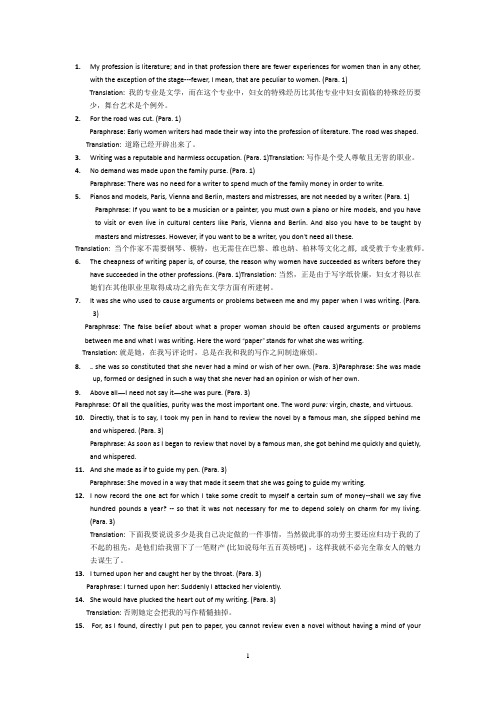
1.My profession is literature; and in that profession there are fewer experiences for women than in any other,with the exception of the stage---fewer, I mean, that are peculiar to women. (Para. 1)Translation: 我的专业是文学,而在这个专业中,妇女的特殊经历比其他专业中妇女面临的特殊经历要少,舞台艺术是个例外。
2.For the road was cut. (Para. 1)Paraphrase: Early women writers had made their way into the profession of literature. The road was shaped.Translation: 道路已经开辟出来了。
3.Writing was a reputable and harmless occupation. (Para. 1)Translation: 写作是个受人尊敬且无害的职业。
4.No demand was made upon the family purse. (Para. 1)Paraphrase: There was no need for a writer to spend much of the family money in order to write.5.Pianos and models, Paris, Vienna and Berlin, masters and mistresses, are not needed by a writer. (Para. 1)Paraphrase: If you want to be a musician or a painter, you must own a piano or hire models, and you have to visit or even live in cultural centers like Paris, Vienna and Berlin. And also you have to be taught by masters and mistresses. However, if you want to be a writer, you don’t need all these.Translation: 当个作家不需要钢琴、模特,也无需住在巴黎、维也纳、柏林等文化之都, 或受教于专业教师。
最新现代大学英语精读5 lesson 4 Professions for Women资料讲解
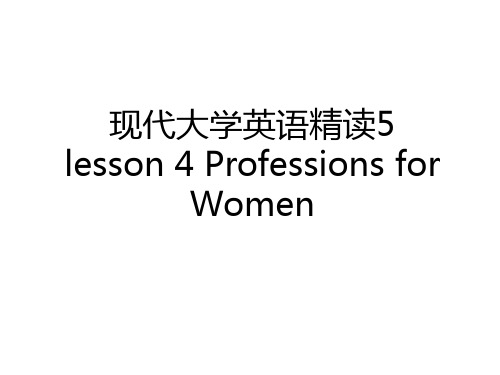
Women
Contents
1 Warm up & Preview
2
Background
3
Text Analysis
ห้องสมุดไป่ตู้
4
Extension
Contents
Warm up: sexism against women Background: Virginia Woolf; Stream of
In a survey, the percentage of women aged 15–49 who thought that a husband is justified in hitting or beating his wife under certain circumstances, was 90% in
Historically, in many patriarchal societies, women have been and are viewed as the "weaker sex". Women's lower status can be seen in cases.
•equality under the law, •political representation of women, •access to education and employment, •language •women victims of domestic violence, •self-ownership of a woman's body, •the possible impact of pornography on women
现代大学英语精读5 Lesson 4 Professions for Women
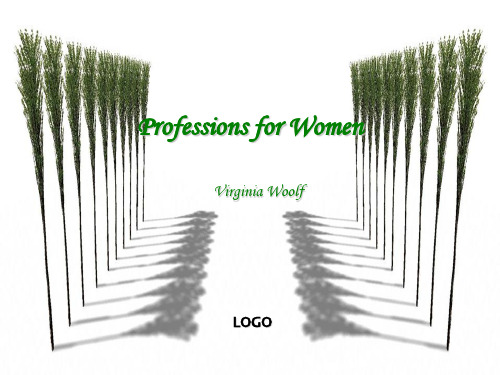
And while I was writing this review, I discovered that if I were going to review books I should need to do battle with a certain phantom. And the phantom was a woman, and when I came to know her better I called her after the heroine of a famous poem, The Angel in the House. In those days – the last of Queen Victoria – every house had its Angel. She slipped behind me and whispered… And she made as if to guide my pen. I turned upon her and caught her by the throat. I did my best to kill her. My excuse,… would be that I acted in self-defence. Had I not killed her she would have killed me. She would have plucked the heart out of my writing. Thus, whenever I felt the shadow of her wing or the radiance of her halo upon my page, I took up the inkpot and flung it at her. She died hard.
现代大学英语精读5 Professions for Women中英文
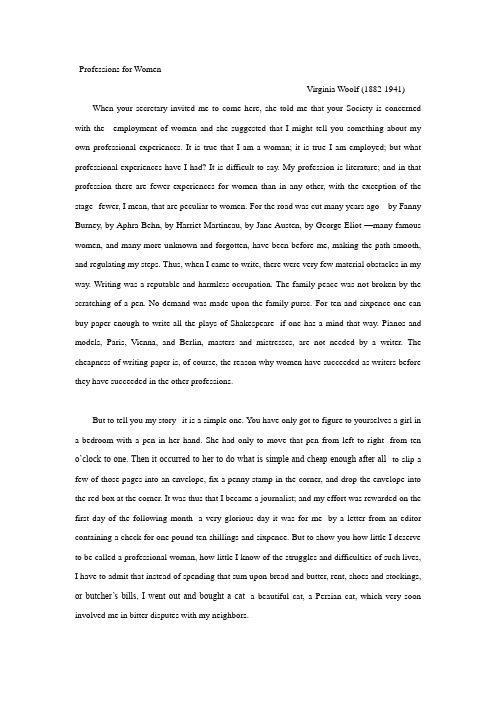
Professions for WomenVirginia Woolf (1882-1941) When your secretary invited me to come here, she told me that your Society is concerned with the employment of women and she suggested that I might tell you something about my own professional experiences. It is true that I am a woman; it is true I am employed; but what professional experiences have I had? It is difficult to say. My profession is literature; and in that profession there are fewer experiences for women than in any other, with the exception of the stage--fewer, I mean, that are peculiar to women. For the road was cut many years ago---by Fanny Burney, by Aphra Behn, by Harriet Martineau, by Jane Austen, by George Eliot —many famous women, and many more unknown and forgotten, have been before me, making the path smooth, and regulating my steps. Thus, when I came to write, there were very few material obstacles in my way. Writing was a reputable and harmless occupation. The family peace was not broken by the scratching of a pen. No demand was made upon the family purse. For ten and sixpence one can buy paper enough to write all the plays of Shakespeare--if one has a mind that way. Pianos and models, Paris, Vienna, and Berlin, masters and mistresses, are not needed by a writer. The cheapness of writing paper is, of course, the reason why women have succeeded as writers before they have succeeded in the other professions.But to tell you my story--it is a simple one. You have only got to figure to yourselves a girl in a bedroom with a pen in her hand. She had only to move that pen from left to right--from ten o’clock to one. Then it occurred to her to do what is simple and cheap enough after all--to slip a few of those pages into an envelope, fix a penny stamp in the corner, and drop the envelope into the red box at the corner. It was thus that I became a journalist; and my effort was rewarded on the first day of the following month--a very glorious day it was for me--by a letter from an editor containing a check for one pound ten shillings and sixpence. But to show you how little I deserve to be called a professional woman, how little I know of the struggles and difficulties of such lives, I have to admit that instead of spending that sum upon bread and butter, rent, shoes and stockings, or butcher’s bills, I went out and bought a cat--a beautiful cat, a Persian cat, which very soon involved me in bitter disputes with my neighbors.What could be easier than to write articles and to buy Persian cats with the profits? But wait a moment. Articles have to be about something. Mine, I seem to remember, was about a novel by a famous man. And while I was writing this review, I discovered that if I were going to review books I should need to do battle with a certain phantom. And the phantom was a woman, and when I came to know her better I called her after the heroine of a famous poem, The Angel in the House. It was she who used to come between me an my paper when I was writing reviews. It was she who bothered me and wasted my time and so tormented me that at last I killed her. You who come off a younger and happier generation may not have heard of her--you may not know what I mean by The Angel in the House. I will describe her as shortly as I can. She was intensely sympathetic. She was immensely charming. She was utterly unselfish. She excelled in the difficult arts of family life. She sacrificed herself daily. If there was chicken, she took the leg; if there was a draft she sat in it--in short she was so constituted that she never had a mind or a wish of her own, but preferred to sympathize always with the minds and wishes of others. Above all--I need not say it--she was pure. Her purity was supposed to be her chief beauty--her blushes, her great grace. In those days--the last of Queen Victoria--every house had its Angel. And when I came to write I encountered her with the very first words. The shadow of her wings fell on my page; I heard the rustling of her skirts in the room. Directly, that is to say, I took my pen in my hand to review that novel by a famous man, she slipped behind me and whispered:“My dear, you are a young woman. You are writing about a book that has been written by a man. Be sympathetic; be tender; flatter; deceive; use all the art and wiles of our sex. Never let anybody guess that you have a mind of our own. Above all, be pure.” And she made as if to guide my pen. I now record the one act for which I take some credit to myself, though the credit rightly belongs to some excellent ancestors of mine who left me a certain sum of money--shall we say five hundred pounds a year? --so that it was not necessary for me to depend solely on charm for my living. I turned upon her and caught her by the throat. I did my best to kill her. My excuse, If I were to be had up in a court of law, would be that I acted in self-defense. Had I not killed her she would have killed me. She would have plucked the heart out of my writing. For, as I found, directly I put pen to paper, you cannot review even a novel without having a mind of your own, without expressing what you think to be the truth about human relations, morality, sex. And all these questions, according to the Angel of the House, cannot be dealt with freely and openly by women; they must charm, they must conciliate, theymust—to put it bluntly-—tell lies if they are to succeed. Thus, whenever I felt the shadow of her wing or the radiance of her halo upon my page, I took up the inkpot and flung it at her. She died hard. Her fictitious nature was of great assistance to her. It is far harder to kill a phantom than a reality. She was always creeping back when I thought I had dispatched her. Though I flatter myself that I killed her in the end, the struggle was severe; it took much time that had better have been spent upon learning Greek grammar; or in roaming the world in search of adventures. But it was a real experience; It was an experience that was bound befall all women writers at that time. Killing the Angel in the House was part of the occupation of a woman writer.But to continue my story. The Angel was dead; what then remained? You may say that what remained was a simple and common object--a young woman in a bedroom with an inkpot. In other words, now that she had rid herself of falsehood, that young woman had only to be herself. Ah, but what is “herself”? I mean, what is a woman? I assure you, I do not know. I do not believe that you know. I do not believe that anybody can know until she has expressed herself in all the arts and professions open to human skill. That indeed is one of the reasons why I have come here--out of respect for you, who are in process of showing us by your experiments what a woman is, who are in process of providing us, by your failures and succeeded, with that extremely important piece of information.But to continue the story of my professional experiences. I made one pound ten and six by my first review; and I bought a Persian cat with the proceeds. Then I grew ambitious. A Persian cat is all very well, I said; but a Persian cat is not enough. I must have a motorcar. And it was thus that I became a novelist--for it is a very strange thing that people will give you a motorcar if you will tell them a story. It is a still stranger thing that there is nothing so delightful in the world as telling stories. It is far pleasanter than writing reviews of famous novels. And yet, if I am to obey your secretary and tell you my professional experiences as a novelist, I must tell you about a very strange experience that befell me as a novelist. And to understand it you must try first to imagine a novelist’s state of mind. I hope I am not giving away professional secrets if I say that a novelist’s chief desire is to be as unconscious as possible. He has to induce in himself a state of perpetual lethargy. He wants life to proceed with the utmost quiet and regularity. He wants to see the samefaces, to read the same books, to do the same things day after day, month after month, while he is writing, so that nothing may break the illusion in which he is living--so that nothing may disturb or disquiet the mysterious nosings about, feelings round, darts, dashes, and sudden discoveries of that very shy and illusive spirit, the imagination. I suspect that this state is the same both for men and women. Be that as it may, I want you to imagine me writing a novel in a state of trance. I want you to figure to yourselves a girl sitting with a pen in her hand, which for minutes, and indeed for hours, she never dips into the inkpot. The image that comes to my mind when I think of this girl is the image of a fisherman lying sunk in dreams on the verge of a deep lake with a rod held out over the water. She was letting her imagination sweep unchecked round every rock and cranny of the world that lies submerged in the depths of our unconscious being. Now came the experience that I believe to be far commoner with women writers than with men. The line raced through the girl’s fingers. Her imagination had rushed away. It had sought the pools, the depths, the dark places where the largest fish slumber. And then there was a smash. There was an explosion. There was foam and confusion. The imagination had dashed itself against something hard. The girl was roused from her dream. She was indeed in a state of the most acute and difficult distress. To speak without figure, she had thought of something, something about the body, about the passions which it was unfitting for her as a woman to say. Men, her reason told her, would be shocked. The consciousness of what men will say of a woman who speaks the truth about her passions had roused her from her artist’s state of unconsciousness. She could write no more. The trace was over. Her imagination could work no longer. This I believe to be a very common experience with women writers--they are impeded by the extreme conventionality of the other sex. For though men sensibly allow themselves great freedom in these respects, I doubt that they realize or can control the extreme severity with which they condemn such freedom in women.These then were two very genuine experiences of my own. These were two of the adventures of my professional life. The first--killing the Angel in the House--I think I solved. She died. But the second, telling the truth about my own experiences as a body, I do not think I solved. I doubt that any woman has solved it yet. The obstacles against her are still immensely powerful--and yet they are very difficult to define. Outwardly, what is simpler than to write books? Outwardly, what obstacles are there for a woman rather than for a man? Inwardly, I think, the case is very different;she has still many ghosts to fight, many prejudices to overcome. Indeed it will be a long time still, I think, before a woman can sit down to write a book without finding a phantom to be slain, a rock to be dashed against. And if this is so in literature, the freest of all professions for women, how is it in the new professions which you are now for the first time entering?Those are the questions that I should like, had I time, to ask you. And indeed, if I have laid stress upon these professional experiences of mine, it is because I believe that they are, though in different forms, yours also. Even when the path is nominally open--when there is nothing to revert a woman from being a doctor, a lawyer, a civil servant--there are many phantoms and obstacles, as I believe, looming in her way. To discuss and define them is I think of great value and importance; for thus only can the labor be shared, the difficulties be solved. But besides this, it is necessary also to discuss the ends and the aims for which we are fighting, for which we are doing battle with these formidable obstacles. Those aims cannot be taken for granted; they must be perpetually questioned and examined. The whole position, as I see it--here in this hall surrounded by women practicing for the first time in history I know not how many different professions--is one of extraordinary interest and importance. You have won rooms of your own in the house hitherto exclusively owned by men. You are able, though not without great labor and effort, to pay the rent. You are earning your five hundred pounds a year. But this freedom is only a beginning; the room is your own, but it is still bare. It has to be furnished; it has to be decorated; it has to be shared. How are you going to furnish it, how are you going to decorate it? With whom are you going to share it, and upon what terms? These, I think are questions of the utmost importance and interest. For the first time in history you are able to ask them; for the first time you are able to decide for yourself what the answers should be. Willingly would I stay and discuss those questions and answers--but not tonight. My time is up; and I must cease.女性职业——弗吉尼亚·伍尔夫你们的秘书告诉我,贵协会所关注的是妇女的就业情况。
现代大学英语第5册(精读5)lesson
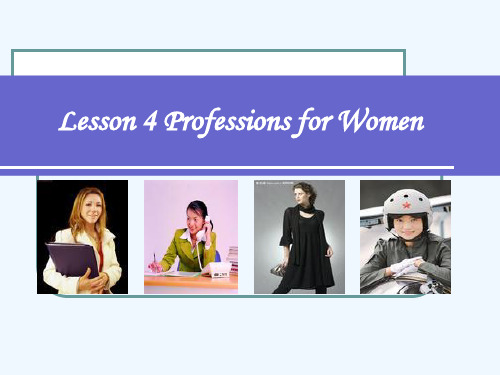
in Ethiopia [i:θi’əupjə]
Women in the past have been excluded from higher education. When women were admitted to higher education, they were encouraged to major in subjects that were considered less intellectual; the study of English literature in English and U.S. colleges and universities was in fact instituted as a field of study considered suitable to women's "lesser intellects.“
I have to keep silent
In which fields are women discriminated?
Sexism against Women
The term 'sexism' is most commonly applied to sexism against women, and expressed by either men or women is called male chauvinism.
Consciousness Text appreciation: the organization of the speech;
高级英语5-lesson-four---Professions-for-women
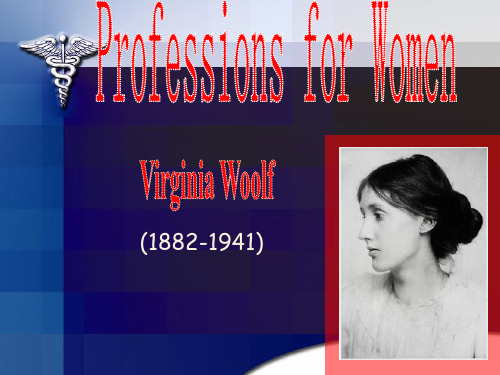
MODERNISM
• Vertically • Classicism • Romanticism • Realism • Modernism • postmodernism
laterally
Symbolism literature Expressionist literatur futurism Stream of consciousnes Image literature
• his 2nd wife Julia Prinsep Jackson, a beauty,widow of Herbert Duckworth,3 kids: George, Stella and Gerald
• 4 kids with Julia:
• Vanessa, Thoby, Virginia, and Adrian
1. Sir Leslie Stephen, anEnglish author, critic and mountaineer
2. his 1st wife Harriet Marian (1840–1875), daughter of W. M.Thackeray, with whom he had a mentally disabled daughter, Laura
Interior Monologue
• In a psychological sense, stream of consciousness is the subject‐matter, while interior monologue is the technique for presenting it".
Three waves of feminism
The first wave--- the campaingn for women’suffrage. Women gained the right to vote(if they were over the age of 30) in 1918 in Britain.
现代大学英语精读5professions_for_women
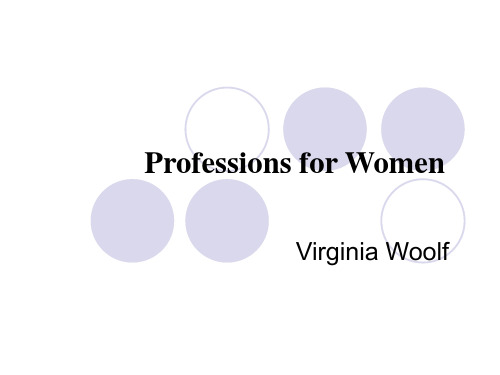
In 1912 she married Leonard Woolf, a critic and writer on economics, with whom she set up the Hogarth Press in 1917. Their home became a gathering place for a circle of artists, critics, and writers known as the Bloomsbury group. As a novelist Woolf’s primary concern was to represent the flow of ordinary experience.
Virginia Woolf (1882-1941) :
English novelist, critic, and essayist. One of the greatest writers of modernism; One of the pioneers of women’s liberation from patriarchy.
Aphra Behn, (1640-1689)
perhaps the first professional English woman writer and playwright Aphra Behn's influence was later applauded by Virginia Woolf in A Room of One's Own, but during her own time she was suspected of plagiarism and accused of lewdness because of her gender. Buried in Westminster Abbey
- 1、下载文档前请自行甄别文档内容的完整性,平台不提供额外的编辑、内容补充、找答案等附加服务。
- 2、"仅部分预览"的文档,不可在线预览部分如存在完整性等问题,可反馈申请退款(可完整预览的文档不适用该条件!)。
- 3、如文档侵犯您的权益,请联系客服反馈,我们会尽快为您处理(人工客服工作时间:9:00-18:30)。
Fanny Burney (1752 –1840)
At 15, burned early writing because her stepmother felt that a reputation for scribbling would harm the girl’s marriage prospects and because she herself was early impressed ‘with ideas that fastened degradation to this class of composition’ then, as now, called the novel. Evelina (1778) ‘Explored the social development of a heroine who proves herself worthy of her well-born suitor’. Cecilia; or Memoirs of an Heiress (1782) ‘Analysized the social and economic problems of women’ Tried to raise the status of the novel by combining verisimilitude with instructions.
Your company slogan
Aphra Behn (1640 –1689)
Spy and playwright, traveler and wit, Aphra Behn was England’s first professional woman writer. In a age when many women of letters were intellectual aristocrats who claimed to write only for pleasure and ‘fame’ among their friends, Behn was a middle-class widow who frankly wrote for money and public acclaim. In 1666, she entered the intelligence service of King Charles II, when such public toils of state affairs were unusual with her sex. She carried out her mission remarkably well, but was never paid properly. So she ended up spending some time in 1668 in a London debtors’ prison, which decided her upon what was, for a woman, an unprecedented step: writing for money. She became a professional and highly productive playwright.
ProfessO
The Victorian ideology of Femininity
The French philosopher Jean Jacques Rousseau, whose demands for human liberty had been influential upon a number of movements for political reform, forcefully articulated some of the most restrictive tenets of what can be called the nineteenth century’s ideology of femininity.
The model woman was an angel or a queen
She must appear delicate, frail, ethereal. She must look and act like a fragile creature. A good woman was essentially passionless: if men were beasts ruled by sexual desire, their pure wives and daughters knew nothing of such matters. It was generally agreed that on her wedding night, the angelic virgin should in one way or another behave as Queen Victoria was said to have: close her eyes and think of England. Otherwise, a woman was in danger of becoming a ‘fallen woman’.
The whole education of women ought to be relative to men. To please them, to console them, and to make life sweet and agreeable to them – these are the duties of women at all times, and what should be taught them from their infancy.’
Man must be pleased, but him to please Is woman’s pleasure; down the gulf
Of his condoled necessities She casts her best, she flings herself….
Your company slogan
Your company slogan
The Victorian ideology of Femininity
The ideal women he thus envisioned – a pure, decorous, and even angelic creature – was only one particularly notable representative of a standard against which every middle- and upper-class woman’s conduct was measured, and other writers, female as well as male, elaborated upon the virtues of such an ideal. In 1854, in a long and very popular poem, ‘The Angle in the House’, Coventry Patmore described such selflessness more extravagantly,
